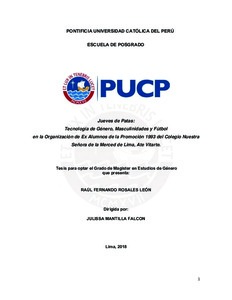| dc.contributor.advisor | Mantilla Falcón, Julissa | |
| dc.contributor.author | Rosales León, Raúl Fernando | es_ES |
| dc.date.accessioned | 2018-10-20T00:10:52Z | es_ES |
| dc.date.available | 2018-10-20T00:10:52Z | es_ES |
| dc.date.created | 2018 | es_ES |
| dc.date.issued | 2018-10-19 | es_ES |
| dc.identifier.uri | http://hdl.handle.net/20.500.12404/12902 | |
| dc.description.abstract | La investigación toma como unidad de análisis a la Organización de Ex Alumnos de
la Promoción 1993 del Colegio Nuestra Señora de la Merced quienes juegan fútbol
los días jueves. La interrogante que guía la investigación ¿Por qué el fútbol como
tecnología de género reproduce la masculinidad hegemónica de los integrantes de
dicha organización? La hipótesis de trabajo consiste en que el fútbol como
tecnología de género reproduce la masculinidad hegemónica porque estructura un
conjunto de representaciones y prácticas de validación homosocial. La metodología
de investigación es cualitativa y las técnicas de recolección de datos están
conformadas por el trabajo de campo, la entrevista semi-estructurada a profundidad,
el registro etnográfico y la Participación Auto-Observante (PAO). Entre los
principales resultados se comprueba que el fútbol como una tecnología de género
está relacionado con la construcción de la masculinidad hegemónica en el marco
de la reproducción de las jerarquías del sistema de género | es_ES |
| dc.description.abstract | The investigation takes as unit of analysis the Organization of ex-students from the
1993 Promotion of the School “La Merced” who plays football every Thursdays. The
question that guides the investigation is: Why does football as a gender technology
reproduce the hegemonic masculinity of the members of that organization? The
hypothesis is that soccer as a gender technology reproduces hegemonic masculinity
because it structures a set of representations and practices of homosocial validation.
The research methodology is qualitative and the data collection techniques of the
fieldwork are the semi-structured interview, the ethnographic record and the Self-
Observing Participation. One of the main results is that football; as a gender
technology, is related to the construction of hegemonic masculinity and the
reproduction of the hierarchies of the gender system | es_ES |
| dc.language.iso | spa | es_ES |
| dc.publisher | Pontificia Universidad Católica del Perú | es_ES |
| dc.rights | info:eu-repo/semantics/openAccess | es_ES |
| dc.rights.uri | http://creativecommons.org/licenses/by-nc-nd/2.5/pe/ | * |
| dc.subject | Masculinidad--Investigaciones--Perú | es_ES |
| dc.subject | Masculinidad--Perú--Estudio de casos | es_ES |
| dc.subject | Futbol--Perú | es_ES |
| dc.subject | Roles sociales--Perú | es_ES |
| dc.title | Jueves de patas: tecnología de género, masculinidades y fútbol en la Organización de Exalumnos de la Promoción 1993 del Colegio Nuestra Señora de la Merced de Lima, Ate Vitarte | es_ES |
| dc.type | info:eu-repo/semantics/masterThesis | es_ES |
| thesis.degree.name | Maestro en Estudios de Género | es_ES |
| thesis.degree.level | Maestría | es_ES |
| thesis.degree.grantor | Pontificia Universidad Católica del Perú. Escuela de Posgrado | es_ES |
| thesis.degree.discipline | Estudios de Género | es_ES |
| renati.discipline | 314327 | es_ES |
| renati.level | https://purl.org/pe-repo/renati/level#maestro | es_ES |
| renati.type | http://purl.org/pe-repo/renati/type#tesis | es_ES |
| dc.publisher.country | PE | es_ES |
| dc.subject.ocde | https://purl.org/pe-repo/ocde/ford#5.09.00 | es_ES |






